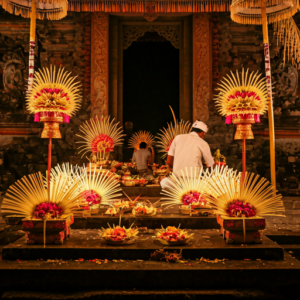
Embark on a culinary journey to the vibrant island of Bali, where the art of cooking is steeped in tradition, flavor, and cultural heritage. Balinese cuisine, renowned for its rich spices, aromatic herbs, and intricate techniques, offers a tantalizing glimpse into the island’s culinary tapestry. Learning Balinese cooking not only allows one to master the art of flavor but also provides a deeper understanding of the island’s culture and way of life. In this exploration, we delve into the essence of Balinese cuisine, uncovering its secrets, and discovering how to spice up your culinary skills through the flavors of Bali.
The Essence of Balinese Cuisine
At the heart of Balinese cuisine lies a harmonious blend of fresh ingredients, aromatic spices, and age-old techniques passed down through generations. Influenced by diverse culinary traditions, including Indian, Chinese, and indigenous flavors, Balinese cuisine is a melting pot of tastes and textures, each dish a reflection of the island’s rich cultural heritage.
Rice, known as „nasi,“ forms the staple of the Balinese diet, accompanied by an array of flavorful side dishes and condiments. From savory curries to fragrant sambals and crispy fritters, Balinese cuisine offers a symphony of flavors that tantalize the taste buds and awaken the senses.
Central to Balinese cooking are the vibrant spices and herbs that infuse each dish with depth and complexity. Turmeric, galangal, lemongrass, and kaffir lime leaves are just a few of the key ingredients that lend Balinese cuisine its distinctive aroma and flavor profile. Balinese cooks harness the power of these spices, expertly balancing sweet, sour, salty, and spicy notes to create dishes that are both satisfying and soul-nourishing.
Techniques such as „base genep,“ a fragrant spice paste made from a medley of herbs and spices, and „betutu,“ a slow-roasted meat dish marinated in a flavorful spice blend, showcase the skill and artistry of Balinese cooking. Whether preparing a simple sate skewer or a lavish ceremonial feast, Balinese cooks approach their craft with reverence and passion, honoring the traditions of their ancestors while embracing innovation and creativity.
Learning the Art of Balinese Cooking
To truly immerse oneself in the world of Balinese cuisine, there’s no substitute for hands-on experience. Fortunately, Bali offers a wealth of opportunities for aspiring cooks to learn from seasoned experts and master the intricacies of Balinese cooking.
Cooking classes abound across the island, ranging from informal home-based sessions to immersive culinary retreats led by professional chefs. These classes provide a unique opportunity to step into the kitchen alongside local experts, gaining insight into traditional techniques, ingredient selection, and flavor combinations.
During a typical Balinese cooking class, participants might start by visiting a local market to select fresh produce and spices, learning about the importance of seasonality and sustainability in Balinese cuisine. Back in the kitchen, they’ll roll up their sleeves and get to work chopping, grinding, and blending ingredients to create a range of classic Balinese dishes.
Under the guidance of experienced instructors, participants learn not only the practical skills of cooking but also the cultural significance behind each dish. Stories and anecdotes shared by the instructors offer a glimpse into Balinese life and traditions, enriching the culinary experience and deepening appreciation for the food on the plate.
Beyond the kitchen, cooking classes often incorporate elements of Balinese culture, such as traditional music and dance performances, or visits to local artisans and craftsmen. These immersive experiences provide a holistic understanding of Balinese life, connecting food with broader cultural practices and beliefs.
Spicing Up Your Culinary Skills
Learning Balinese cooking goes beyond mastering recipes; it’s about embracing a way of life that celebrates community, creativity, and connection to the land. Armed with newfound skills and inspiration, participants of Balinese cooking classes return home with a treasure trove of recipes and techniques to spice up their culinary repertoire.
One of the most valuable lessons of Balinese cooking is the art of improvisation and adaptation. Balinese cuisine is highly flexible, allowing cooks to experiment with different ingredients and flavor profiles to suit their tastes and preferences. Whether recreating a traditional Balinese feast or putting a modern twist on a classic dish, the principles of Balinese cooking provide a solid foundation for culinary exploration and innovation.
Moreover, learning Balinese cooking fosters a deeper appreciation for the importance of mindfulness and intentionality in the kitchen. Balinese cooks approach their craft with a sense of reverence, honoring the ingredients, the process, and the people who will ultimately enjoy the meal. By infusing each dish with love and care, cooks not only nourish the body but also feed the soul, creating a truly transformative culinary experience.
Conclusion
Learning Balinese cooking is more than just mastering recipes; it’s an invitation to embark on a sensory journey through the flavors, aromas, and traditions of the island. Balinese cuisine, with its vibrant spices, fresh ingredients, and time-honored techniques, offers a window into the rich tapestry of Balinese culture and way of life. Whether participating in a cooking class in Bali or recreating Balinese dishes at home, the experience of learning Balinese cooking is sure to spice up your culinary skills and leave a lasting impression on your taste buds and your soul.





